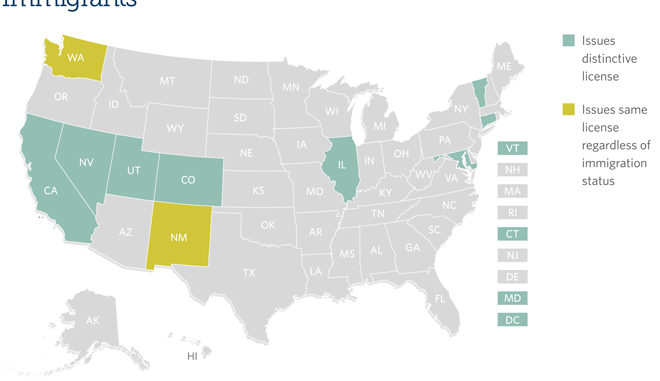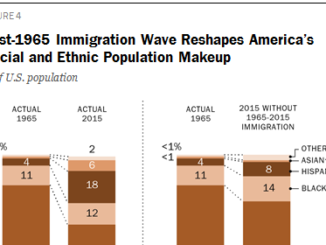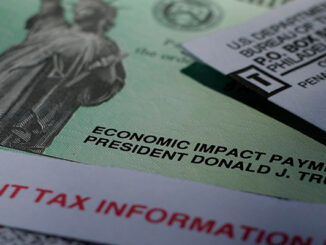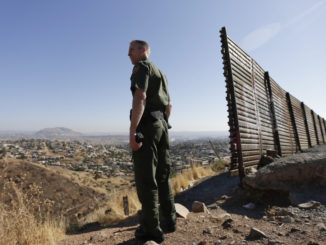
By Alex Gonzalez
This week, The Pew Charitable Trust released a report showing all the states that now allow undocumented residents to have driver’s licenses or driving permits. The report show that currently there are now 12 states and the District of Columbia that allows these residents legally drive.
Technology is of the mechanisms used by many states to verify the identity of the person applying for this document, and comply with federal laws such as The REAL ID legislation passed by Congress in 2005 to prevent terrorists from obtaining this document. One of those states was California, state with the largest population of undocumented residents followed by Texas in second place.
The process of verifying the identity of a person applying for this document is important for Texas since currently the state is being sued by 23 immigrant families from Mexico, Guatemala and Honduras because in some counties the State Health Services offices are denying birth certificates to children born in Texas; the parents lack state ID/Driver’s licenses, or Passport with a valid visa.
The lawsuit against the state claims that the Texas is imposing much stricter policies that effectively blocked the child from getting a birth certificate. Some parents have both a matricula and Mexican passport that were issued in Texas and they tried using them to obtain a birth certificate for the newborns, but the State Health Services office in six counties have said they would no longer accept either the passport with no visa or the matricula.
At issue, according to state officials Texas Attorney General Ken Paxton challenging the lawsuit from these families, is the validity of the identification process used by Mexican consulates to verify the parents are who they say they are. Ken Paxton challenges the lawsuit arguing that Texas doesn’t believe Mexico applies stringent enough background checks to verify the parents’ identities when they issue Passports or matriculas in Mexican consulates in Texas.
So Texas is now being sued because state officials within the State Health Services are using independent discretion to deny birth certificates to American citizens because, they argue, the state guidelines issued, long ago, states that matriculas did not have stringent enough background to verify the identity of the applicants. Nevertheless, the State Health Services agency never followed these recommendations, or guidelines. For many following this case, it has become an issue only in the last year, which some claim is due to the current “hot rhetoric” on immigration.
To avoid this problem of people claiming to be who they are not some states issuing driver’s licenses to undocumented resident, some states have set up joint efforts between the state agencies and the Mexican consulates to verify the identity of the person and the validity of the document; and this mechanism could solve the issue of the birth certificate in Texas, and it would also serve if Texas decides to grant driver’s licenses to undocumented resident next Session, which some legislators are thinking about. Texas, after all, is second to California when it comes to undocumented workers.
The Pew report shows that, in California for example,
In December 2014, the California Department of Motor Vehicles signed a memorandum of understanding with the Mexican Foreign Ministry to verify the documents of Mexican foreign nationals applying for driver’s licenses. This action was the result of lengthy communications between the state and the Mexican Consulate. Mexicans are estimated to constitute more than two-thirds of California’s unauthorized immigrant population and represent the majority of those likely eligible to obtain licenses.
After the passage of the state’s licensing legislation, known as A.B. 60, officials from the Department of Motor Vehicles (DMV) met with representatives from the Mexican Consulate in Sacramento to better understand the issuance and security features of Mexican identity documents. DMV officials visited the consulate and witnessed the production of consular registration cards (known in Spanish as matriculas consulares). Satisfied with their security features, the DMV released guidance stating that it would accept Mexican passports, consular identification cards, and voter registration cards as sufficient proof of identity. That meant applicants with one of these documents would not need to provide a secondary form of identification.
To assist the DMV in determining the validity of the documents, the Mexican Foreign Ministry created an online electronic system that provides real-time verification of passports and consular registration cards. Now in use across the state, this system allows issuing agency workers to scan the approved Mexican identity documents and instantaneously receive confirmation of a document’s integrity. The system does not provide any personal information about the applicants. Individuals who do not receive instant confirmation proceed to a secondary interview where they must provide a second identification document.
Under the terms of the memorandum, the Mexican Foreign Ministry and the state DMV each are responsible for covering their own costs. The ministry funds the creation and maintenance of the database, while California covers the costs of installing verification scanners in DMV offices.
By the end of July, 442,000 AB 60 driver licenses issued from January 2, 2015 to July 31, 2015. This is the total number of unique individuals who started the application process in July 2015. 742,000 Number of AB 60 had applied for a license from January 2, 2015 to July 31, 2015. This makes half for the estimated 1.3 million of undocumented residents the DMV had estimated will apply for the license.
The technology used by the DMV and Mexican consulates in California allowed that in only 6 months the identity of 742,000 people was verify through immediate scanning and matched with the database created by the Mexican consulates under the supervision of the DMV observers. Moreover, any cost associated with the process was paid by the applicant and the Mexican government.
This is model that the state of Texas can adopt to avoid any misapprehension that it is deliberately making hard for people to get birth certificates to target some immigrant communities – especially Hispanic community in Texas. The Attorney General office needs to point out where the problem is, and work with Mexican consulates to rectify the problem so American citizens don’t have to be denied a basic constitutional right, as noted by the Dallas editorial Board.
With the current political climate of gridlock in Congress, any meaningful immigration reform is dead so states – both Republican and Democrat states- are taking the lead and becoming more proactive and crafting policies to accommodate their respective undocumented population because these policy makers understand that this problem is not going nowhere, and Congress is paralyzed with political bickering.
The failure of Congress to pass immigration is forcing state to become more proactive to fix what the federal government has failed to do. As noted by Alex Nowrasteh from CATO, California and Texas are working to craft legislations to visa programs to get around the federal immigration reform gridlock; this work should also include, in Texas, the creation of state ID to verify the identity of those living in the state with no immigration status, like those 12 other states that already issue driver’s licenses that comply with federal laws and do not violate any immigration federal laws.
In the past, we have proposed specific rules to a driver’s licenses in Texas. The model used on California could be workable model that those conservative Republican in the legislature can support.
Alex Gonzalez is a political Analyst and Political Director for Latinos Ready To Vote. Comments: [email protected]



